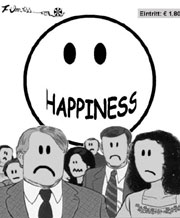 |
| Unhappiness has risen in the past decade. |
There's more misery in people's lives today than a decade ago.
So says a new study on life's negatives from the University of Chicago's National Opinion Research Center, which conducts social science research for government agencies, educational institutions, non-profit organizations and private corporations.
The researchers surveyed 1,340 people about negative life events and found that the 2004 respondents had more troubles than those who were surveyed in 1991.
"The anticipation would have been that problems would have been down," says Tom Smith, the study's author. He says good economic years during the '90s would have brought an expectation of fewer problems, not more.
Overall, the percentage who reported at least one significant negative life event increased from 88% to 92%. Most of the problems were related to increased incidents of illness and the inability to afford medical care; mounting bills; unemployment; and troubled romantic relationships.
On a more positive note, fewer of those surveyed reported having trouble with crime or the law.
The University of Chicago report is part of a larger study known as the larger General Social Survey, which is supported by the National Science Foundation and financed throughgrants.
Some of the problems outlined in the study were more complicated than just a single bad event. For instance, the inability to afford health care rose from 7% in 1991 to 11% in 2004. Those who said they lacked health insurance increased from 12% to 18%. On the romantic front, the percentage who reported breaking up with a steady partner doubled from 4% to 8%.
But people shouldn't despair even if there is trouble around them. Bad experiences don't necessarily make people unhappy, says Jonathan Haidt, an associate professor of psychology at the University of Virginia and author of the new book The Happiness Hypothesis.
He advises a three-point check-up on the state of personal relationships, the work environment and control over daily life, because improving those areas will boost happiness.
(Agencies)
|
如今,人们生活中的烦恼比十年前多了很多。
芝加哥大学国民心理研究中心所做的一项关于生活中消极因素的研究如是说。该研究中心受政府部门、教育机构、非盈利性组织以及私人企业的委托进行了社会科学调查。
研究人员对1340个人在生活中遇到的消极事件进行了调查,发现2004年被调查者的烦恼比1991年的要多。
研究报告的撰写者汤姆·史密斯说,"按照我们的预测,烦恼应该比原来少才对。"他说,90年代经济状况好转,这应该使人们的烦恼减少,而不是增多。
从整体上看,说自己至少有一件重大消极事件的人数比例从88%上升到了92%。大多数的烦恼是生病次数增多,无力支付医疗费用、失业以及爱情受挫。
值得庆幸的是,被调查对象中很少有人说自己的烦恼和犯罪或法律事件有关。
芝加哥大学的报告是大规模社会普查的一部分,社会普查由国家科学基金会支持,它的主要经费来源是政府拨款。
研究中列出的一些"烦恼"相当复杂,并不是某一件麻烦事。比如,无力支付保健费用的人数比例从1991年的7%增长到了2004年的11%。说自己没有健康保险的人从12%上升到了18%。而和长期交往的伴侣分手的人数比例则翻了一番,从4%增至8%。
弗吉尼亚大学心理学副教授乔纳森·哈德特说,即使有麻烦困扰,人们也不应该绝望。不幸的经历不一定会让人悲伤。乔纳森·哈德特是新书《快乐假设说》的作者。
他建议对人际关系、工作环境和个人日常生活管理这三个方面加强重视,因为这些方面的改善会让快乐"升值"。
(中国日报网站编译)
|
